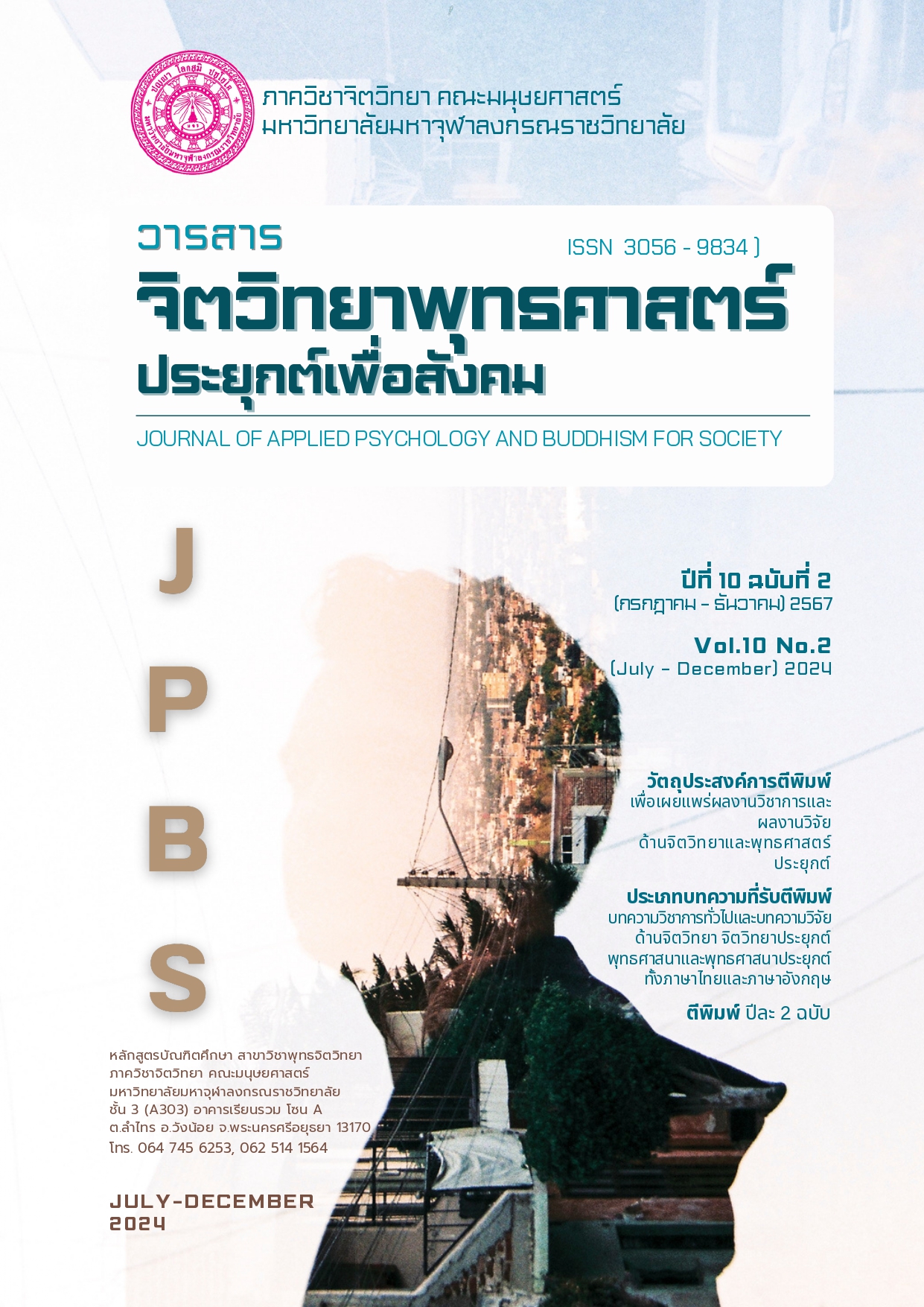Buddhist Psychology Model for Leadership Personality Development in Private Business Organizations
Keywords:
Model, Buddhist Psychology, Personality Development, Leadership, Organization, Business SectorAbstract
The objectives of this research were: 1. to study the personality traits of organizational leaders in the private business sector based on psychological and Buddhist principles; 2. to develop a model for enhancing the personality traits of organizational leaders in the private business sector according to Buddhist psychology; and 3. to present a model for developing organizational leaders' personality based on Buddhist psychology. This study was conducted within a qualitative research framework to explore and develop a Buddhist psychological model for the development of leadership personality traits in the private business sector. The research process involved in-depth data analysis and synthesis using various research methods, including: 1) document research, 2) in-depth interviews, 3) the creation and development of a model for enhancing leadership personality traits with Buddhist psychology, 4) focus group discussions, and 5) expert panel meetings (Connoisseurship) to generate knowledge.
The research led to the development of the "Buddhist Psychology Power Mindset Model," abbreviated as "B2P2M + 5A," which focuses on the development of organizational leaders' personalities in the private business sector. This model consists of eight key components: 1) Buddhist mindfulness power, 2) internal personality (six character traits), 3) external personality (DISC model), 4) mindset, 5) skillset, 6) toolset, 7) development process, and 8) virtuous character according to the Seven Principles of a Noble Person (Sappurisadhamma). The integration of these seven elements results in a leadership transformation characterized by "Sappurisa" (a virtuous leader), which is a desirable quality of effective leaders who serve as good role models. The model aims to enhance both the internal and external personality traits of leaders, leading to a change in their mindset and behavior, ultimately empowering them to lead their organizations and bring about sustainable positive change.
References
ชิสา กันยาวิริยะ. (2563). ภาวะผู้นำตามหลักพุทธปรัชญาเถรวาท. วารสารการวิจัยการบริหารการพัฒนา, 10(3), 57.
ชำนาญ วงรัศมีเดือน และคณะ. (2562). การจัดการพฤติกรรมมนุษย์ตามแนวจริตในพระพุทธศาสนา. วารสารสันติศึกษาปริทรรศน์ มจร, 7(3), 766-778.
ประเวช วะทาแก้ว. รูปแบบภาวะผู้นำตามแนวพระพุทธศาสนา. วารสารวิชาการวิทยาลัยบริหารศาสตร, 3(3), 94.
ป. อ. ปยุตฺโต (พระพรหมคุณาภรณ์). (2551). พจนานุกรมพุทธศาสตร์ ฉบับประมวลธรรม. กรุงเทพฯ : โรงพิมพ์มหาจุฬาลงกรณราชวิทยาลัย.
“_______”. (2551). พจนานุกรมพุทธศาสน์ ฉบับประมวลศัพท์ (พิมพ์ครั้งที่ 17). กรุงเทพฯ : โรงพิมพ์แห่งจุฬาลงกรณ์ราชวิทยาลัย.
พระศรศักดิ สงฺวโร. (2555). การวิเคราะห์จริต 6 กับการปฏิบัติธรรมในพระพุทธศาสนา (วิทยานิพนธ์พุทธศาสตรมหาบัณฑิต สาขาพระพุทธศาสนา). มหาวิทยาลัยมหาจุฬาลงกรณราชวิทยาลัย. พระนครศรีอยุธยา.
พระอุปติสสเถระ. (2551). วิมุตติมรรค (พิมพ์ครั้งที่ 5). กรุงเทพฯ : สำนักพิมพ์ศยาม บริษัทเคล็ดไทย จำกัด.
วรธณัท ธัญญหาญ. (2556). อ่านและเข้าใจคนขั้นเทพ (Reading and Understanding People). กรุงเทพฯ : มายเบสท์บุคส์.
อนุสรณ์ จันทพันธ์ & บุญชัย โกศลธนากุล. (2557). จริต 6 ศาสตร์ในการอ่านใจคน. กรุงเทพฯ : อมรินทร์พริ้นท์ติ้งแอนด์พับลิชชิ่ง.
อุดมพร ชั้นไพบูลย์. (2012). การประยุกต์ใช้สัปปุริสธรรมในงานสังคมสงเคราะห์ ในการพัฒนาสังคมด้วยหลักธรรมทางพุทธศาสนา. กรุงเทพฯ : สำนักพิมพ์ธรรมศึกษา.
DeGraffe, K. (2021). Executive coaching and leadership personality defects Coaching Leaders: Insights and Applications. J., London: Kogan Page.
Koutsioumpa, M. (2023). Personality Traits and Leadership Effectiveness in the Five-Factor Model, in Handbook of Leadership Personality Development, edited by John A. Smith, vol. 2, New York: Academic Press.
Downloads
Published
How to Cite
Issue
Section
Categories
License
Copyright (c) 2024 Journal of Applied Psychology and Buddhism for Society

This work is licensed under a Creative Commons Attribution-NonCommercial-NoDerivatives 4.0 International License.






